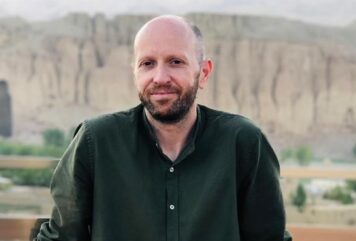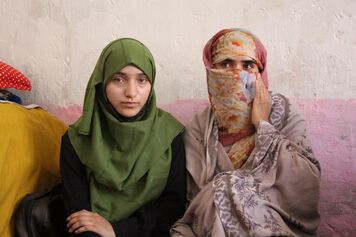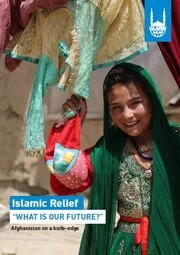Islamic Relief this week publishes a new report calling for urgent action to address the economic crisis in Afghanistan. Alun McDonald recently visited the country and met families who are struggling to survive.

One year ago, images of the chaos at Kabul airport were broadcast all around the world, as desperate families attempted to flee.
Today, life for most families has got much worse as Afghanistan’s economy has collapsed and hunger and poverty have spiralled out of control. 24 million people, more than half the entire population, now need aid.
Behind that shocking statistic are real people. When I visited Afghanistan recently, it was heart-breaking to see how people were struggling to survive. I met mothers who couldn’t sleep due to stress because they’ve had to take on crippling levels of debt just so their children can eat some bread each day. I met young girls worried about being married off as their parents couldn’t afford to feed them. In Islamic Relief clinics, long lines of parents brought their malnourished children, looking for help.
There are markets full of food, but people don’t have money to buy it. Girls are desperate to learn but they’re not allowed to go to school. Men and women are looking for work but jobs have disappeared.
Amid the enormous suffering, it was impossible not to be humbled by Afghan generosity and kindness – people shared aid packs with those even less fortunate and offered visitors a cup of refreshing green tea even when that was literally all they had left.
I met 7-year-old Zainab whose sick mother received treatment at one of the health clinics set up by Islamic Relief. Since then, Zainab stops to help out at the clinic every day on her way home from school – she fills water jugs and sweeps the floor as the nurses treat the patients.
When I asked her why, she simply said, “When you help us, we must also help you”.
But how much is the international community helping Afghanistan?
Billions of development dollars in limbo
Over the past year, international humanitarian aid has saved countless lives by providing vital food and water.
But the international response in the year since the Taliban took control is also making the economic crisis worse. Billions of dollars in development assistance have been stopped, and billions more in assets belonging to Afghanistan’s Central Bank have been frozen in US, UK and European bank accounts. The liquidity crisis means that many public services have ground to a halt – teachers and doctors aren’t being paid, health centres have shut down and impoverished widows aren’t getting their pensions.
International sanctions and banking restrictions have made it difficult for humanitarian agencies and the private sector to get money into the country.
This is hurting vulnerable Afghan civilians most of all – especially women and girls. Almost half of women-owned small businesses have shut down. Girls are most likely to be malnourished, and face being married off because their parents can’t afford to feed them.
One teenage girl I met summed it all up: “My parents have no money, our neighbours have no money, I can’t go to school, there are no jobs.”
With so little to look forward to she asked us, “What is our future?”
Steps for a brighter future
That’s the title of a new report published this week by Islamic Relief. It sets out 10 steps we want the international community to prioritise in order to save lives, protect livelihoods and ensure a better future for Afghan civilians.
Those 10 steps include reinstating international development assistance, providing technical support to Afghanistan’s Central Bank, unfreezing assets, tackling international banking restrictions and supporting Afghan civil society. It also calls on the Islamic Emirate of Afghanistan to uphold the rights of women and girls.
Our report calls for a new international approach to Afghanistan that builds on the positive impact of humanitarian aid, gets the economy back on its feet and ensures that people can access cash, educate their children, find jobs and feed their families.
That’s what Islamic Reliefs projects in Afghanistan are trying to do. For example, our new partnership with the United Nations Development Programme (UNDP) aims to create jobs, inject cash and support women-run small businesses across Afghanistan.

We’re supporting inspiring young girls like 16-year-old Rozita, who was devastated when her school was shut down last year. Her father was killed when she was very young and her mother, Uzma, has brought Rozita up alone with cash support from Islamic Relief.
They don’t have much money for food or rent but they spend every spare penny on Rozita’s education – paying for private and community classes so that she doesn’t fall behind while girls’ schools are closed.
They are determined to keep alive Rozita’s dream of becoming her community’s first female doctor.
Afghan women and men just want a better future for their children and are doing everything they can to make that happen in incredibly difficult circumstances.
But they need the world’s support. With the right support now from the international community, their future can still be much brighter.
Help us continue supporting the people of Afghanistan. Donate now.
BROWSE OTHER OPINIONS
FEATURED OPINIONS
- One million people across the globe will get safe deliveries of food this month, insha’Allah
- Honouring our humanitarian heroes – before, during and after the pandemic
- Earth faces a constant state of crisis, fuelled by the biggest emergency of all
- “Ramadan is over but we mustn’t forget about those suffering in Mali”
- Professor Saleemul Huq, pioneering climate change scientist, 1952 – 2023
MOST POPULAR TOPIC
View More










